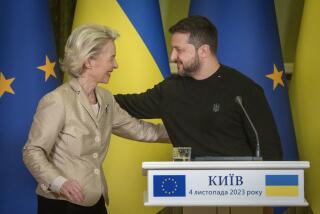Turkey Offers Reform Plan in Hopes of EU Admission
- Share via
ANKARA, Turkey — The Cabinet on Monday approved a detailed program of political, economic and legal reforms in Turkey aimed at securing the predominantly Muslim nation’s long-cherished goal of joining the European Union.
But the 1,000-page document, which requires the approval of parliament, lacks commitments that European leaders have insisted on as conditions for starting talks on Turkey’s EU membership.
The plan includes steps to improve Turkey’s human rights record, combat the torture of prisoners, enhance women’s rights and bring the country’s inflation-prone economy up to European standards.
It stops short, however, of offering full linguistic rights to Turkey’s Kurdish minority, civilian control over the armed forces, or a withdrawal of Turkish troops from the divided island of Cyprus.
The initiative won approval of Turkey’s three-party governing coalition hours after the new economic minister announced measures aimed at pulling the country out of financial crisis.
Mesut Yilmaz, the deputy prime minister in charge of European affairs, told reporters that the reform plan is “irrevocable proof of the government’s determination to join the European Union.”
The blueprint calls on parliament to pass 89 laws and amend 94 others. Yilmaz said the changes must be completed within five years or Turkey risks missing out when the EU expands.
Turkey, a firm U.S. ally and member of the North Atlantic Treaty Organization, won formal acceptance as a candidate for EU membership in December 1999. European officials then set conditions they expect Turkey to meet.
It was clear from Monday’s announcement that Turkish military commanders and an ultranationalistic wing of the civilian-led government are resisting many of those conditions.
The EU has demanded that Turkey lift its bans on broadcasting and education in the Kurdish language, abolish the death penalty, and make compromises with Greece on long-running disputes over Cyprus and territorial rights in the Aegean Sea.
Turkey’s military commanders, who have seized power three times in the last four decades, are reluctant to make such changes. They also want to preserve what in effect is a veto over government decisions, exercised through a National Security Council that the Europeans want to see weakened.
The plan outlined Monday defends the council’s powers. It promises a review of the death penalty and continued talks with Greece. In a carefully worded section, the document states that Turkish is the language of officialdom and education but affirms the right of other languages and dialects to be freely used.
European diplomats here say the EU’s membership rules cannot be bent to suit the wishes of individual applicants.
But Yilmaz said Monday that the EU must consider Turkey’s “special circumstances” when assessing its membership qualifications. No other applicant, he said, has endured a 15-year terrorist campaign like the one fought by Kurdish separatists in southeastern Turkey.
The country’s most immediate task is ending a month-old financial crisis. Economic Minister Kemal Dervis, a former World Bank official who took charge of the country’s finances two weeks ago, said Turkey and the International Monetary Fund have agreed on an anti-inflation plan. The deal will result in new IMF loans of unspecified value.
More to Read
Sign up for Essential California
The most important California stories and recommendations in your inbox every morning.
You may occasionally receive promotional content from the Los Angeles Times.













